A federal court in Boston has ruled that warrantless U.S. government searches of the phones and laptops of international travelers at airports and other U.S. ports of entry violate the Fourth Amendment.
Tuesday's ruling in U.S. District Court came in a lawsuit filed by the American Civil Liberties Union and the Electronic Frontier Foundation on behalf of 11 travelers whose smartphones and laptops were searched without individualized suspicion at U.S. ports of entry.
ACLU attorney Esha Bhandari said the ruling strengthens the Fourth Amendment protections of international travelers who enter the United States every year.
The ACLU describes the searches as "fishing expeditions." They say border officers must now demonstrate individualized suspicion of contraband before they can search a traveler's electronic device.
The government has vigorously defended the searches as a critical tool to protect America.
The number of electronic device searches at U.S. ports of entry has increased significantly, the ACLU said. Last year, the government conducted more than 33,000 searches, almost four times the number from just three years prior.
Documents filed as part of the lawsuit claim the scope of the warrantless searches has expanded to assist in enforcement of tax, bankruptcy, environmental and consumer protection laws, gathering intelligence and advancing criminal investigations.
The court documents also said agents with U.S. Customs and Border Protection and U.S. Immigration and Customs Enforcement consider requests from other government agencies in determining whether to search travelers' electronic devices. They added that agents are searching the electronic devices of not only targeted individuals but their associates, friends and relatives.
Requests for comment from Customs and Border Protection, Immigration and Customs Enforcement and the Department of Homeland Security were not immediately returned Tuesday.
Jessie Rossman, a staff attorney at ACLU's Massachusetts chapter, said the ruling is a victory for constitutional protections against unreasonable searches and seizures.
"The court said today that suspicionless searches at the border of cell phones and laptops violate the Fourth Amendment," Rossman said.
Rossman said two of the plaintiffs — Ghassan and Nadia Alasaad — were stopped as they tried to re-enter the U.S. after a visit to Canada. Both are U.S. citizens and live in Massachusetts.
Rossman said Nadia Alasaad felt uncomfortable handing over passwords because she wears a head covering as part of her religious beliefs.
She asked that a female officer review her phone because it contained photos of her and her daughters without their headscarves. Alasaad said she was told that would take a few more hours.
The couple, who had already been delayed several hours, ultimately decided to leave their phones — which they did not have returned to them for 15 days, according to Rossman.
Ten of the plaintiffs in the case were U.S. citizens. One was a permanent legal resident.
When the suit was filed in 2017, Department of Homeland Security officials said U.S. citizens and everyone else are subject to examination and search by customs officials, unless exempted by diplomatic status.
Searches, some random, have uncovered evidence of human trafficking, terrorism, child pornography, visa fraud, export control breaches and intellectual property rights violations, according to the department.
Rossman said the court acknowledged that the sheer volume of digital information accessible on a phone or laptop is vastly different than more traditional searches of briefcases or backpacks.
"It's the difference between a ride on a horse and a flight to the moon," Rossman said.
TOKYO (AP) — The American envoy to the United Nations called Friday for countries armed with atomic weapons to pursue nuclear disarmament as she visited the atomic bomb museum in Nagasaki, Japan.
Linda Thomas-Greenfield, who became the first U.S. cabinet member to visit Nagasaki, stressed the importance of dialogue and diplomacy amid a growing nuclear threat in the region.
“We must continue to work together to create an environment for nuclear disarmament. We must continue to prevent the spread of nuclear weapons in every corner of the world,” she said after a tour of the atomic bomb museum.
“For those of us who already have those weapons, we must pursue arms control. We can and must work to ensure that Nagasaki is the last place to ever experience the horror of nuclear weapons,” she added, standing in front of colorful hanging origami cranes, a symbol of peace.
The United States dropped the world’s first atomic bomb on Hiroshima on Aug. 6, 1945, destroying the city and killing 140,000 people. A second attack three days later on Nagasaki killed 70,000 more people. Japan surrendered on Aug. 15, ending World War II and its nearly half-century of aggression in Asia.
Nagasaki Gov. Kengo Oishi said in a statement that he believed Thomas-Greenfield's visit and her first-person experience at the museum “will be a strong message in promoting momentum of nuclear disarmament for the international society at a time the world faces a severe environment surrounding atomic weapons.”
Oishi said he conveyed to the ambassador the increasingly important role of Nagasaki and Hiroshima in emphasizing the need of nuclear disarmament.
Thomas-Greenfield's visit to Japan comes on the heels of Prime Minister Fumio Kishida's official visit to the United States last week and is aimed at deepening Washington's trilateral ties with Tokyo and Seoul. During her visit to South Korea earlier this week, she held talks with South Korean officials, met with defectors from North Korea and visited the demilitarized zone.
The ambassador said the United States is looking into setting up a new mechanism for monitoring North Korea's nuclear weapons program. Russia and China have thwarted U.S.-led efforts to step up U.N. sanctions on North Korea over its ballistic missile testing since 2022, underscoring a deepening divide between permanent Security Council members over Russia’s war on Ukraine.
She said it would be “optimal” to launch the new system next month, though it is uncertain if that is possible.
The U.N. Security Council established a committee to monitor sanctions, and the mandate for its panel of experts to investigate violations had been renewed for 14 years until last month, when Russia vetoed another renewal.
In its most recent report, the panel of experts said it is investigating 58 suspected North Korean cyberattacks between 2017 and 2023 valued at approximately $3 billion, with the money reportedly being used to help fund its weapons development.
The United States, Japan and South Korea have been deepening security ties amid growing tension in the region from North Korea and China.
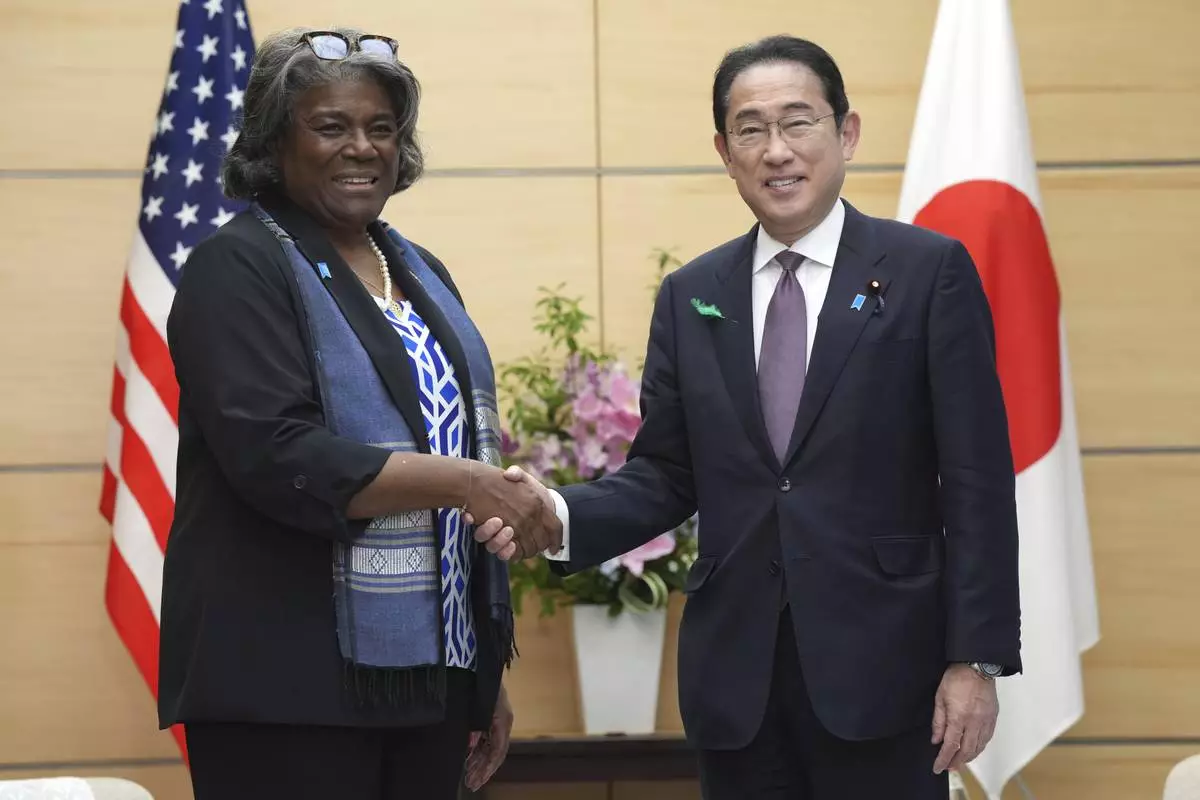
U.S. Ambassador to United Nations Linda Thomas-Greenfield, left, and Japan's Prime Minister Fumio Kishida, right, shake hands during a meeting Friday, April 19, 2024, at prime minister's office in Tokyo. (AP Photo/Eugene Hoshiko, Pool)
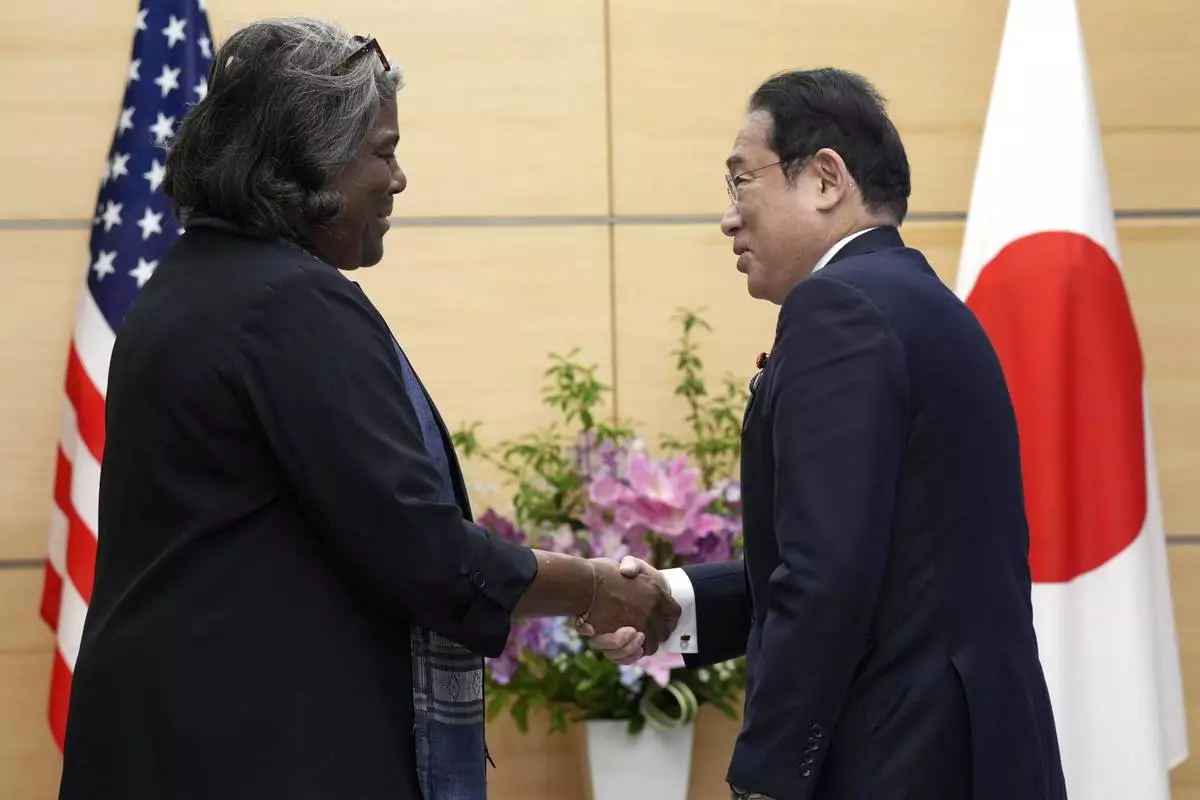
U.S. Ambassador to United Nations Linda Thomas-Greenfield, left, and Japan's Prime Minister Fumio Kishida, right, shake hands during a meeting Friday, April 19, 2024, at prime minister's office in Tokyo. (AP Photo/Eugene Hoshiko, Pool)
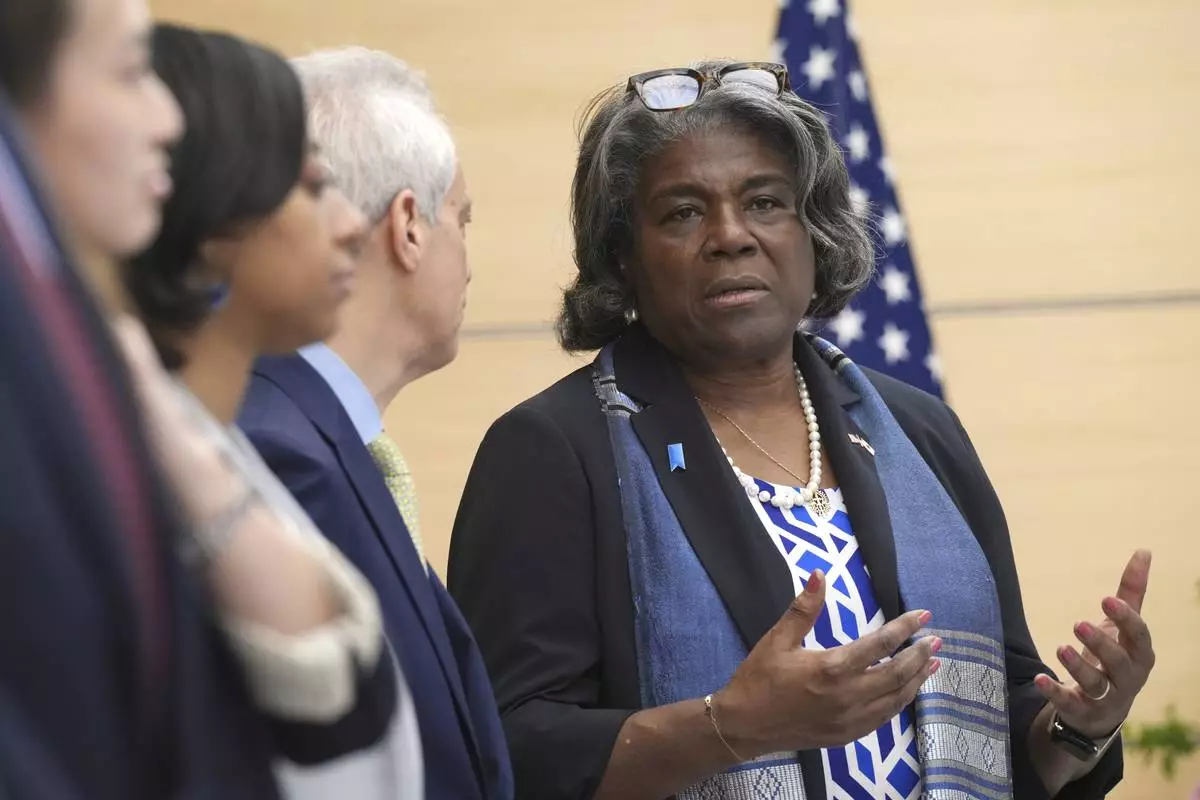
U.S. Ambassador to United Nations Linda Thomas-Greenfield, right, speaks to Rahm Emanuel, U.S. Ambassador to Japan, second right, as they wait for a meeting with Japan's Prime Minister Fumio Kishida Friday, April 19, 2024, at prime minister's office in Tokyo. (AP Photo/Eugene Hoshiko, Pool)
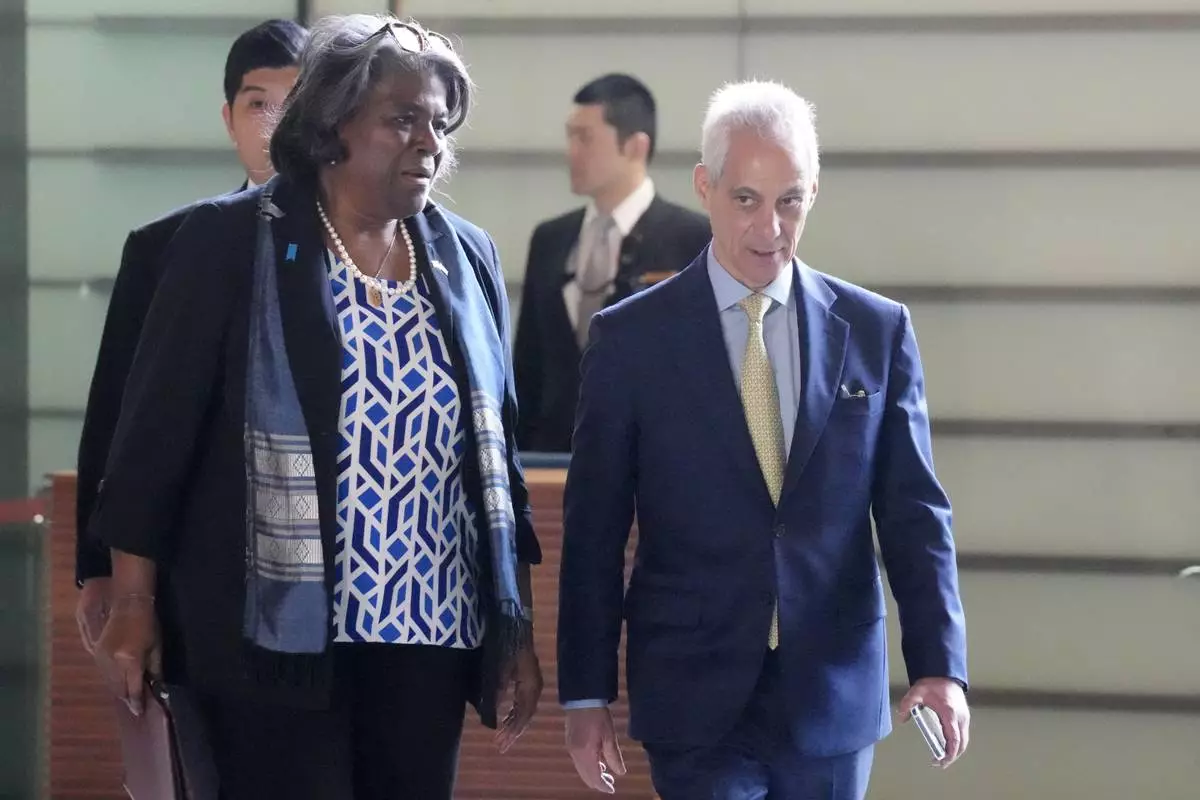
U.S. Ambassador to United Nations Linda Thomas-Greenfield, left, and Rahm Emanuel, U.S. Ambassador to Japan, right, walk to meet Japan's Prime Minister Fumio Kishida Friday, April 19, 2024, at prime minister's office in Tokyo. (AP Photo/Eugene Hoshiko, Pool)
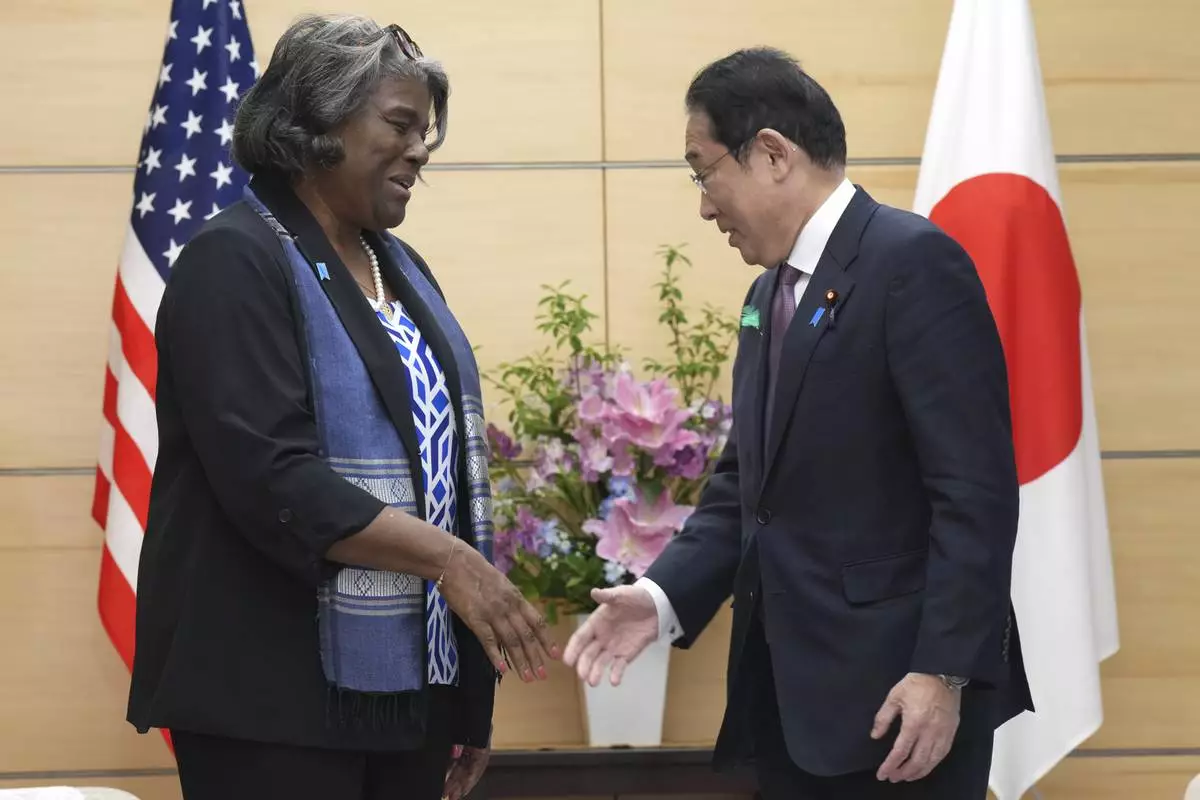
U.S. Ambassador to United Nations Linda Thomas-Greenfield, left, and Japan's Prime Minister Fumio Kishida, right, talk prior to a meeting Friday, April 19, 2024, at prime minister's office in Tokyo. (AP Photo/Eugene Hoshiko, Pool)
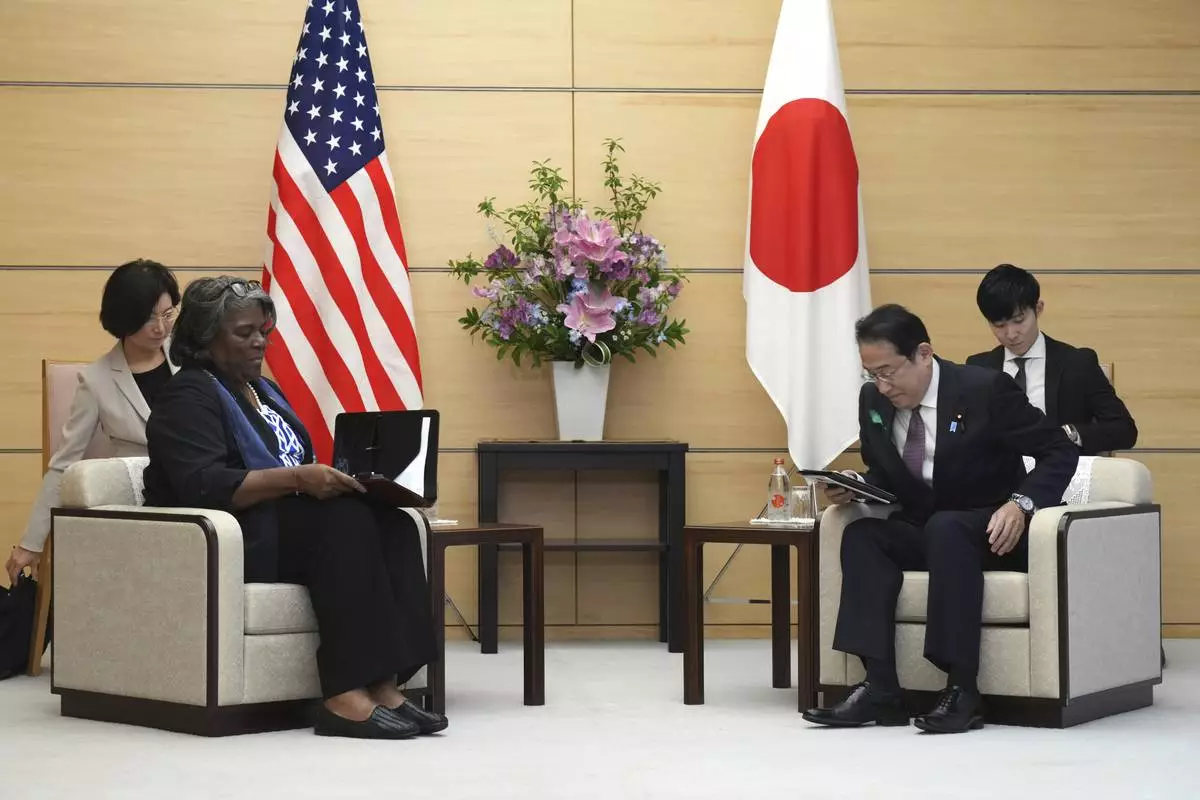
U.S. Ambassador to United Nations Linda Thomas-Greenfield, left, and Japan's Prime Minister Fumio Kishida, right, prepare to talk during a meeting Friday, April 19, 2024, at prime minister's office in Tokyo. (AP Photo/Eugene Hoshiko, Pool)















